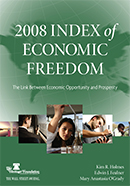From Naenara:
The Law of the DPRK on Foreign-invested Bank was adopted by Decision No. 42 of the Standing Committee of the Supreme People’s Assembly on November 24, 1993 and amended by Decree No. 484 of the Presidium of the SPA on February 26, 1999. It was amended by Decree No. 3400 of the Presidium of the SPA on November 7, 2002.
The law consists of 32 articles in 5 chapters.
Chapter 1. Fundamentals (Articles 1-7)
This chapter stipulates that the law shall contribute to the expansion and development of cooperation with different countries the world over in the area of finance.
A foreign investor may establish and operate a foreign-invested bank within the territory of the DPRK.
Foreign-invested banks include joint venture banks, wholly foreign-owned banks and branches of foreign banks.
The state shall protect the legal rights and interests of foreign-invested banks established in the territory of the DPRK.
Chapter 2. Establishment and Dissolution of Foreign-invested Banks (Articles 8-17)
This chapter stipulates that an investor who intends to establish a foreign-invested bank in the territory of the DPRK shall file an application to the DPRK Central Bank, declaring the name of the bank, the name and curriculum vitae of its president, the registered capital, paid-up capital, operation fund, investment rate, details of business, etc.
The Central Bank of the DPRK shall decide upon the approval or rejection of the application within 50 days from its receipt.
A foreign-invested bank shall be dissolved when it cannot continue its operation due to such reasons as the expiry of the term approved, merger of the banks, insolvency, defaulting of the contract and natural calamities.
Chapter 3. Capital and Reserve Funds of Foreign-invested Banks (Articles 18 – 22)
This chapter stipulates that a foreign-invested bank shall deposit the primary paid-up capital and operating capital with a bank designated by the Central Bank of the DPRK within 30 days from the date when it obtained the approval of establishment and shall have it confirmed by a certified public accountant.
A joint venture bank and a wholly foreign-owned bank shall set aside as reserve fund 5 per cent of its annual profits each year until the reserve fund grows to 25 per cent of the registered capital and a foreign-invested bank may reserve such funds in need as bonus fund, welfare fund and R&D fund.
Chapter 4. Transactions and Settlement of Foreign-invested Banks (Articles 23 – 28)
This chapter stipulates that a foreign-invested bank may engage in part or whole of the following transactions:
A· Accepting deposits of foreign currencies of foreign-invested enterprises, foreign enterprises and
foreigners,
B· Granting loans in foreign currencies, overdrafting on the current account excess payment and
discounting of foreign currency bills,
C· Dealing in foreign exchange,
D· Investment in foreign currencies,
E ·Guarantee against liabilities in foreign currencies and defaulting of contract obligations,
F· Remittance of foreign currencies,
G· Transactions of securities in foreign currencies,
H· Trust banking,
I· Credit survey and consultation.
A foreign-invested bank shall open an account with the branch of the Central Bank of the DPRK in the area where it is located and deposit the reserve fund for deposit payment.
A foreign-invested bank shall submit to the foreign exchange control organ the annual balance sheet and profit and loss account confirmed by a certified public accountant within 30 days from the date of the completion of the annual business settlement, and the quarterly financial statement and necessary statistics by the 15th day of the first month of the ensuing quarter of the year.
Chapter 5. Penalties and Settlement of Disputes (Articles 29 – 32)
This chapter stipulates that a foreign-invested bank shall be liable to fining in the following cases:
J · In case it has changed its president or vice-president or the location of the bank without approval,
K· In case it has failed to set aside the reserve fund of required amount,
L· In case it has obstructed or caused difficulties in inspection, and
M· In case it has failed to submit regular reports within a fixed period of time, or submitted false ones.
In case a foreign-invested bank engages in other transactions than those approved, or revises the memorandum, or increases or decreases the registered capital and operating capital without approval, it may be ordered out of operation.
In case an applicant for establishment of a bank fails to commence banking business within 10 months from the date of the approval, the approval granted for establishment of the bank may be withdrawn.
The Law of the DPRK on Foreign-invested Bank shall ensure stability of activities of foreign-investors and contribute to the expansion and development of the external economic relations by establishing system and order for foreign-invested banks.

 The
The